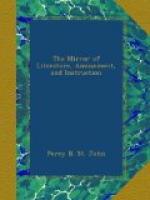Tullia.—We knew nothing about stockings, which, as a useful and agreeable invention, I certainly prefer to our sandals.
Mad. da P.—Good heavens, madam, I believe you’ve no chemise!
Tullia.—No, madam, in my time nobody wore one.
Mad. de P.—And in what time did you live?
Tullia.—In the time of Sylla, Pompey, Caesar, Cato, Cataline; and Cicero, to whom I have the honour of being daughter: of that Cicero, of whom one of your proteges has made mention in barbarous verse.[3] I went yesterday to the theatre, where Cataline was represented with all the celebrated people of my time, but I did not recognise one of them; and when my father exhorted me to make advances to Cataline, I was astonished! But, madam, you seem to have some beautiful mirrors; your chamber is full of them; our mirrors were not a sixteenth part so large as yours; are they of steel?
Mad. de P.—No, madam, they are made with sand, and nothing is more common amongst us.
Tullia.—What an admirable art! I confess we had none such! And oh! what a beautiful painting too you have there!
Mad. de P.—It is not a painting, but a print, done merely with lamp-black; a hundred copies of the same design may be struck off in a day, and this secret immortalizes pictures, which time would otherwise destroy.
Tullia.—It is indeed an astonishing secret! we Romans had nothing like it!
Un Savant.—(A literary man there present, taking up the discourse, and producing a book from his pocket, says to Tullia:) You will be astonished, madam, to learn, that this book is not written by hand, but that it is printed almost in a manner similar to engravings; and that this invention also immortalizes works of the mind.
(The Savant presents his book, a collection of verses dedicated to the Marchioness, to Tullia, who reads a page, admires the type, and says to the author:)
Tullia.—Truly, sir, printing is a fine thing; and if it can immortalize such verses as these, it appears to me to be the noblest effort of art. But do you not at least employ this invention in printing the works of my father?
The Savant.—Yes, madam, but nobody reads them; I am truly concerned for your father, but in these days, little is known of him save his name.
(Here are brought in chocolate, tea, coffee, and ices. Tullia is astonished to see, in summer, cream and strawberries[4] iced. She is informed that such congealed beverages are obtained in five minutes, by means of the salt-petre with which they are surrounded, and that by continual motion, is produced their firmness and icy coldness. She is speechless with astonishment. The dark colour of the chocolate and coffee, somewhat disgust her, and she asks whether these liquids are extracted from the plants of the country?—A duke who is present, replies:)




